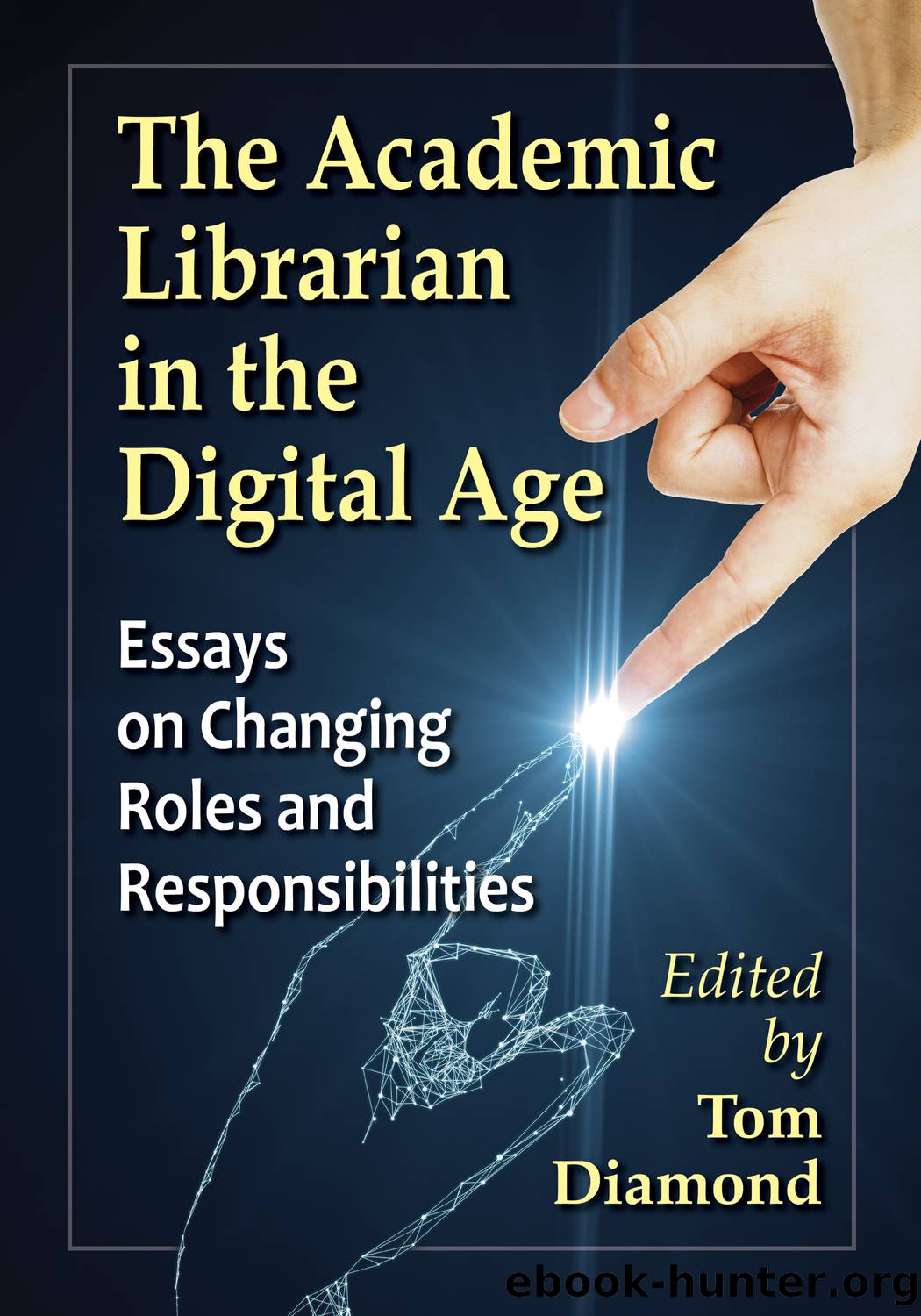The Academic Librarian in the Digital Age by Tom Diamond;

Author:Tom Diamond;
Language: eng
Format: epub
Publisher: McFarland & Company, Inc.
Published: 2020-08-13T00:00:00+00:00
Documents ÂDe-Emphasized?
The Shifting Roles of Government Information Professionals
Kenya Flash and Dominique Hallett
Introduction
In recent years, members of the public displayed greater concern about government information. The government shutdown in early 2019 severely impacted investorsâ, farmersâ, researchersâ, and journalistsâ access to critical government information (DeSilver 2019). Researchers frustrated with this turn of events suggested the need for free, public repositories, and even mentioned the Federal Depository Library Program (FDLP). James Jacobs called on libraries to make the next government information access crisis impossible (Jacobs 2019). In earlier times, the visible loss of access to government data would be minimal, not so immediate, or raise such an outcry. However, with the available technological advances, the public expects government information to be easily accessible and always available. Government information professionals are champions in the fight to make government documents accessible; however, technology is now drastically challenging, changing, and impacting how these information professionals engage in their work.
Government shutdowns and loss of access to government information are examples of how access to government information is indispensable in our current society. It is also important to note the important definition of government information and the important roles played by government information professionals. U.S. government information, and related products, is information that is âpublished, compiled or created by the government, at government expense or as required by lawâ (University of Louisiana at Lafayette University Libraries 2019). Government information professionals are those who have a formal role that is heavily influenced by the production, dissemination, and/or use of government information. These professionals include, but are not limited to, professionals, paraprofessionals, vendors, public librarians, and academic librarians. This essay will focus primarily on the roles played by librarians.
Changing Roles
Changes in perception and use of government information are impacting society and librarians. A primary reason for this change is technologyâs influence on the way society accesses and utilizes government information. Historically, those looking for access to government information would trek to their local government deposit library or a regional deposit library to locate needed materials. These libraries housed materials such as executive, congressional, or agency documents shared through the FDLP, which is operated by the Government Publishing Office (GPO). Currently, most government agencies publish and disseminate a variety of products through the Internet, and even depository libraries highlight web resources. The shift to easily accessible information for patrons has meant changes for the FDLP, GPO, and for the roles of government information professional.
From the patronâs standpoint, the changing roles of the FDLP and GPO are important as they ensure materials reach libraries, but why explore that of the government information professional? The government information librarian is highly focused on ensuring continuing access to government information. This includes finding, ensuring usability, and preserving the materials in the same manner as most librarians. These ideas are like the stewardship role of librarians in taking care of their collections. While all librarians focus on information stewardship, government information librariansâ stewardship has unique societal responsibilities. These societal responsibilities infuse these professionals with the drive to make this information as widely and easily accessible as possible.
Download
This site does not store any files on its server. We only index and link to content provided by other sites. Please contact the content providers to delete copyright contents if any and email us, we'll remove relevant links or contents immediately.
Cecilia; Or, Memoirs of an Heiress — Volume 1 by Fanny Burney(32054)
Cecilia; Or, Memoirs of an Heiress — Volume 3 by Fanny Burney(31453)
Cecilia; Or, Memoirs of an Heiress — Volume 2 by Fanny Burney(31402)
The Great Music City by Andrea Baker(30778)
We're Going to Need More Wine by Gabrielle Union(18626)
All the Missing Girls by Megan Miranda(14709)
Pimp by Iceberg Slim(13771)
Bombshells: Glamour Girls of a Lifetime by Sullivan Steve(13680)
Fifty Shades Freed by E L James(12908)
Talking to Strangers by Malcolm Gladwell(12864)
Norse Mythology by Gaiman Neil(12819)
For the Love of Europe by Rick Steves(11432)
Crazy Rich Asians by Kevin Kwan(8883)
Mindhunter: Inside the FBI's Elite Serial Crime Unit by John E. Douglas & Mark Olshaker(8697)
The Lost Art of Listening by Michael P. Nichols(7157)
Enlightenment Now: The Case for Reason, Science, Humanism, and Progress by Steven Pinker(6869)
The Four Agreements by Don Miguel Ruiz(6310)
Bad Blood by John Carreyrou(6271)
Weapons of Math Destruction by Cathy O'Neil(5824)
